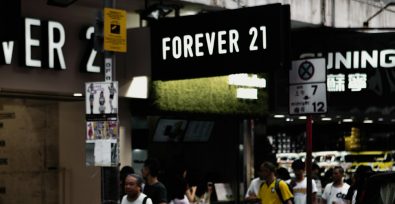Forever 21 helped invent the fast fashion playbook—turning catwalk looks into cheap mall trends at breakneck speed. Now it’s filing for bankruptcy. But its fall isn’t a victory for sustainability. It simply couldn’t keep up with today’s ultra-fast fashion juggernauts like Shein and Temu. These new giants move faster, sell cheaper, and rake in billions—all while operating supply chains laced with labor rights abuses.
Another one bites the dust?
Before there was Shein, there was Forever 21, a popular brick-and-mortar store that peaked in 2015. The retailer was known for the addictive adrenaline rush gotten by sifting through clothing offered at ridiculously cheap prices. A reaction that used to be hard to duplicate in online shopping and before the evils of fast fashion were well known. But today’s shopping climate is very different, and Forever 21 is paying the price.
The New York Times reports,
Using social media and influencers to push its $10 dresses and $7 tops, Shein saw its revenue explode to $38 billion in 2024. (Though many items cost less, Shein’s clothes average $14 an item, according to a 2023 report by the website Business of Fashion and the consulting firm McKinsey & Company.) Forever 21’s revenue, meanwhile, peaked at $4.4 billion back in 2015.
Shein did not win by being more careful with its workers. The 2022 documentary “Untold: Inside the Shein Machine” by Britain’s Channel 4 included footage of employees who worked up to 18 hours a day making hundreds of clothing items on a daily salary of as little as $20, which could drop to as low as $7 if they made mistakes, with one day off a month. In May 2024, an investigation by the Swiss watchdog group Public Eye found similar conditions at Shein suppliers.
So, what’s changed and why?
During the COVID pandemic, online retailers, including fashion, really took off. Now in the post-pandemic era, many retailers like Forever 21 and malls more broadly are struggling to survive. Other fast fashion retailers have perfected the art of gamifying cheap online shopping.
The surge in ultra-fast fashion is not only detrimental to Forever 21’s survival but also poses a significant challenge for its workforce. Forced labor, wage theft, and dangerous working conditions are all built into the business model. Shein, which tried to go public in the US and was blocked in part over forced labor concerns, is now seeking a London IPO instead. And it’s not alone. A growing number of online-only brands are rushing to replicate its model, creating a race to the bottom with human rights left behind.
So, while users may be getting “great deals” and a dopamine hit, someone else is paying the price.
According to US Senator Rubio,
“Private firms and journalists have unearthed compelling evidence that both Shein and Temu are facilitating the entry of goods made with Uyghur forced labor…I urge you to investigate these companies.”
Take action
At Freedom United, we know that exploitation isn’t a glitch in this system—it’s a feature. The pressure to produce more for less means forced labor thrives in fashion’s shadows, from garment factories to cotton farms.
That’s why we’re pushing for global brands to take real responsibility for their supply chains—and for governments to pass laws that hold them accountable. Until then, the system will keep rewarding the companies that exploit the most, the fastest.
Help us keep the momentum going and add your voice to those saying no to the high cost of fast fashion.







Freedom United is interested in hearing from our community and welcomes relevant, informed comments, advice, and insights that advance the conversation around our campaigns and advocacy. We value inclusivity and respect within our community. To be approved, your comments should be civil.